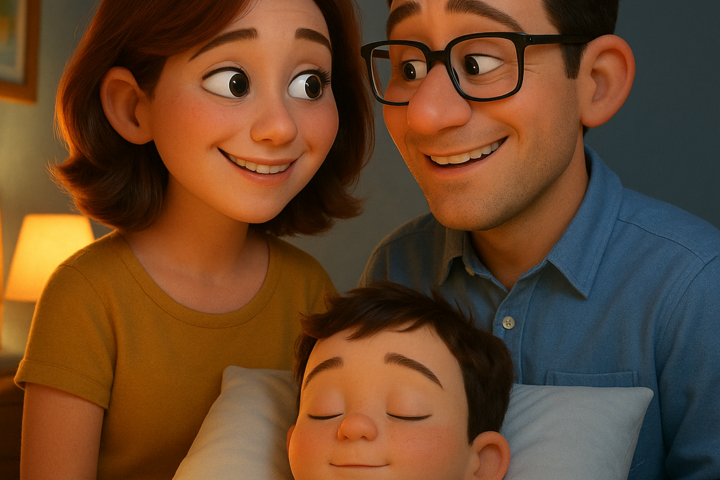What happens when your relationship starts to feel like a crowd of three—you, your partner, and their depression?
You’re not imagining it. When your partner has depression, it can start to feel like the relationship is no longer just between two people. The joy that once floated effortlessly between you begins to fade. Conversations thin. Laughter shrinks. And in its place? A heavy, invisible presence that hijacks connection and inserts a quiet but persistent wedge.
You may feel like you’re trying to hold space for someone who’s no longer fully present.
If this resonates, you’re not alone. This post will help you:
-
Recognize how your partner’s depression is impacting your relationship
-
Understand what happens when that emotional weight starts to affect you
-
Learn what to do (and what not to do)
-
Build boundaries that support both of you
-
Know when it’s time for extra help—especially for you
Let’s begin by understanding what depression actually does to relationships. Then download the workbook for FREE.
When Depression Is the Relationship
Depression doesn’t just cloud thoughts—it warps connection. It flattens pleasure, dulls motivation, and distorts how a person experiences closeness. Even if your partner deeply loves you, depression can drown their capacity to show it.
Here’s what often shows up when your partner has depression:
-
Emotional withdrawal: They may seem distant or unreachable.
-
Loss of interest: Shared activities that once brought joy feel meaningless to them now.
-
Irritability or shutdowns: Not because of you—but you’re often the nearest target.
-
Apathy: They may express a lack of motivation, which can feel like they’ve stopped trying.
“When your partner has depression, even the most well-intended moments of connection can feel one-sided or rejected.”
And here’s the part we don’t talk about enough: this changes the relational dynamic. You might find yourself carrying the emotional load, trying to generate hope, joy, or energy—for both of you.
Signs That Their Depression Is Affecting You Too
Living with a depressed partner can be deeply depleting. It’s not just their world that shifts—yours does, too.
Here are signs your nervous system might be under siege:
-
Compassion fatigue: You still care, but you’re exhausted.
-
Caretaking role creep: You feel more like a parent or nurse than a partner.
-
Mood hypervigilance: You monitor their energy, hoping to prevent a crash.
-
Self-silencing: You avoid bringing up your own needs to “protect” them.
-
Guilt or shame: You feel bad for being overwhelmed, resentful, or… human.
🧠 “Just because your partner has depression doesn’t mean your needs become invalid. Both things can be true: they’re struggling—and you’re struggling too.”
Let’s pause here together: What have you been carrying that isn’t yours to hold?
What to Do When You Feel Like You’re Losing Yourself
First, it’s okay to name it. You’re not being selfish. You’re being honest. And honesty is the only path toward healing—for both of you.
Start here:
-
Acknowledge your own emotional experience. Suppressing your pain to protect someone else only creates distance.
-
Set internal boundaries. It’s okay to take mental space from their depression—even when you can’t take physical space.
-
Reconnect with your identity. What parts of you have you neglected? Music? Creativity? Friendship?
-
Build your own support system. This could mean therapy, friends, online groups, or communities like NAMI’s family support groups.
-
Journal prompt: “What am I carrying that isn’t mine to hold?”
“Living with a depressed partner can feel like you’re walking on emotional eggshells. But you deserve solid ground, too.”
Supporting Your Partner Without Losing Yourself
There’s a delicate balance between compassion and codependency.
Here’s how you can be a loving presence—without becoming a life raft:
| Support | Saving |
|---|---|
| “I’m here with you.” | “Let me fix this for you.” |
| Listening without solving | Managing all their responsibilities |
| Encouraging therapy | Becoming their therapist |
| Naming what’s true with care | Silencing your own truth |
💡 Try this shift: Use “we” language that reinforces partnership, not a parent/child dynamic.
“We’re in this together, and I want us both to get the support we need.”
It also helps to understand why your partner might seem frozen or disconnected. Depression often triggers what’s known as dorsal vagal shutdown, a nervous system state where the body protects itself through disconnection. This isn’t laziness—it’s survival physiology. To learn more, explore Polyvagal Theory.
Red Flags You Shouldn’t Ignore
While depression can explain many behaviors, it doesn’t excuse everything.
Be mindful of these red flags:
-
Suicidal thoughts or behaviors – Don’t minimize or ignore these. Call a crisis line (988 in the US) or seek emergency support.
-
Abuse masked as depression – Verbal, emotional, or physical harm needs to be addressed separately.
-
Gaslighting – If your emotional reality is denied or twisted, seek help immediately.
-
No effort toward help – If your partner consistently refuses treatment or deflects responsibility, it’s time for hard conversations.
Remember: You are not obligated to sacrifice your well-being for someone else’s healing.
When to Consider Couples Therapy
If the weight of depression has reshaped the fabric of your relationship, couples therapy can be a powerful space for repair and reconnection.
Here’s why:
-
A therapist offers neutral ground. It’s not about blame—it’s about understanding.
-
It names the dynamic without making the partner “the problem.”
-
It helps define the “space between”—the invisible but potent emotional climate that you both co-create.
Want to explore this option? Feel free to contact me or check out therapist directories .
Final Thought: You Deserve Care Too
Loving someone with depression is brave.
But bravery doesn’t mean self-abandonment.
Let this land:
You’re not failing for feeling tired. You’re human.
Supporting a partner through depression is not a solo mission.
The relationship can only survive if both people have support, space, and the capacity to reconnect.
So here’s your gentle permission slip:
-
Take a break.
-
Text a friend.
-
Book the therapy session.
-
Say the hard thing with love.
You get to take up space in this relationship, too.
If you found this article helpful, share it with others, because we’re all in this together.
Here’s another article that you might like: How To Help Children Understand A Parent’s Depression











